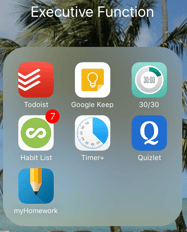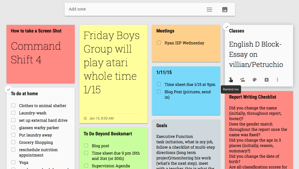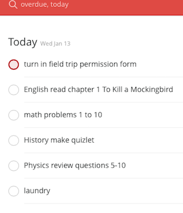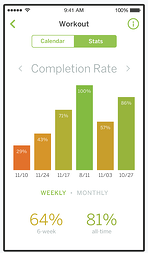“What are good apps I should get for my phone?”
A few months ago, my dad finally upgraded his old flip phone to a smartphone. Everytime I see him, he asks me what my favorite apps are  that he should download. Once I told him the obvious, like Facebook, Fitbit and Waze, I was at a bit of a loss each time he asked. Eventually, I realized he was trying to update his “smartphone toolbox” or “go-to” applications to make the most of his new phone.
that he should download. Once I told him the obvious, like Facebook, Fitbit and Waze, I was at a bit of a loss each time he asked. Eventually, I realized he was trying to update his “smartphone toolbox” or “go-to” applications to make the most of his new phone.
His question got me thinking about how I update my toolbox as an Executive Function coach and Speech-Language Pathologist. Sure, I attend renowned continuing education events, and read journal articles written by experts in the field, but recently my favorite tools have come from my students and colleagues at Beyond BookSmart. I start each coaching session with a new student learning about what Executive Function tools he or she currently uses to record assignments, manage time or emotions, and prioritize work. By actively learning about the applications one student uses successfully, I can more effectively coach other students with whom I work. I wanted to share with you my new top 3 Executive Function apps to answer the question “What are good apps to get on my phone?”
 1) Google Keep
1) Google Keep
I have an unhealthy obsession with sticky notes, so much so that I bring a little bag with me full of different color and size notes for my students to choose from. I used to love the sticky note feature built in on my computer, but I had so many that they covered my desktop. When a student introduced me to Google Keep as his way to record homework assignments, I was immediately hooked. Google Keep is one of my top executive function apps to develop time management, planning, and prioritizing skills. It is linked to your google account and is accessible on your computer, smartphone, and tablet. Other helpful features include color coding notes for different categories and setting reminders to complete a task. No more excuses that your child ignored or lost her to do list!
 2) ToDoist
2) ToDoist
Another one of my students introduced me to ToDoist. (You read that correctly, it’s ToDoist, not another To Do List). I was so impressed with how he used ToDoist to create folders for each class, as well as add, reorder and break down assignments that I knew other students would have success with this tool. Recently, I introduced this tool to one student as a way to help him record his daily assignments and prioritize work. He hadn’t yet established a consistent method for recording assignments, but as he set up his classes, he said, “This is easy! I really like that you can type in 'tom' and it schedules the task for tomorrow.” I knew I had some buy-in, and following that, his consistent use of this tool will help him reach his academic goals.
3) Habit List
I discovered Habit List through a fellow Beyond BookSmart coach as a “New to You” tool presented during monthly group supervision. Habit List is a tool to help build positive habits and track trends over time. Initially I was skeptical. Why would I encourage my students to  pay $3.99 for an application when there are plenty of adequate free applications? Because it works! Keeping track of my New Year’s resolutions seemed like the perfect reason to try out this application and build positive routines for myself before modeling the skill for my students. It is pretty exciting to check off an item and see trends grow on the monthly calendar. The reminders to complete a habit really helps build accountability. I’ve never been more motivated and successful crossing going to the gym off my list!
pay $3.99 for an application when there are plenty of adequate free applications? Because it works! Keeping track of my New Year’s resolutions seemed like the perfect reason to try out this application and build positive routines for myself before modeling the skill for my students. It is pretty exciting to check off an item and see trends grow on the monthly calendar. The reminders to complete a habit really helps build accountability. I’ve never been more motivated and successful crossing going to the gym off my list!
I am always looking to fill my coaching toolbox with effective strategies — and my students and colleagues are rich sources for new ideas. So now I ask you: “Does your child have any good apps you should download on your phone?”
If your child could benefit from academic coaching to develop his or her own Executive Function toolbox, please click below to schedule a free consultation.
 Lindsay Schelhorn, M.S., CCC-SLP is an Executive Function coach and a certified Speech-Language Pathologist. She currently works as a Speech-Language Pathologist at the Clearway School in West Newton, MA. After completing her bachelor's degree in Psychology at Gettysburg College in Pennsylvania, Lindsay completed a graduate certificate in Autism Studies at West Chester University in Pennsylvania. She graduated from Mass General Hospital’s Institute of Health Professions with her degree in Communication Sciences and Disorders. She feels passionately about guiding teenagers and young adults to becoming more independent by increasing their confidence in functional skills, and teaching them strategies to increase their understanding and awareness of the relationship between social skills and executive functioning skills.
Lindsay Schelhorn, M.S., CCC-SLP is an Executive Function coach and a certified Speech-Language Pathologist. She currently works as a Speech-Language Pathologist at the Clearway School in West Newton, MA. After completing her bachelor's degree in Psychology at Gettysburg College in Pennsylvania, Lindsay completed a graduate certificate in Autism Studies at West Chester University in Pennsylvania. She graduated from Mass General Hospital’s Institute of Health Professions with her degree in Communication Sciences and Disorders. She feels passionately about guiding teenagers and young adults to becoming more independent by increasing their confidence in functional skills, and teaching them strategies to increase their understanding and awareness of the relationship between social skills and executive functioning skills.

 1) Google Keep
1) Google Keep 2) ToDoist
2) ToDoist